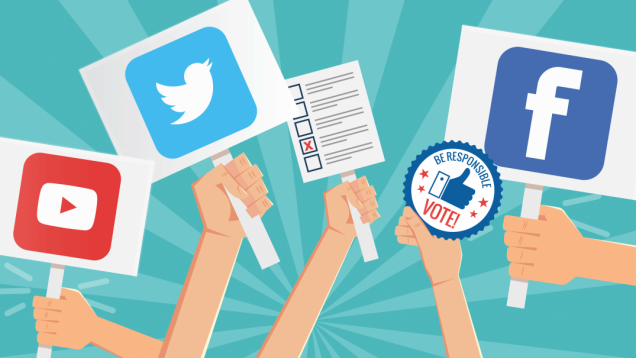The Importance of Political Literacy in an Increasingly Illiterate Age

Image Courtesy of Boston University
By Jeremy Perillo, Politics Editor for The Tower
The politics of the United States is and has been increasingly dramatic and polarized. If the past year has been any indication, no matter the issue, there will be conflicting positions, regardless of what is at stake.
A problem has emerged in our advanced technological age that affects every person regardless of their “faction”: the lacking importance of political literacy, which can be identified as “the basic concepts and facts that constitute a necessary condition for comprehending the contents of public debate.”
As consumers, Americans are heavily reliant on social media and major media organizations for both their political news and education, to an extent that has created vast political illiteracy.
According to the Pew Research Center, about one in five U.S. adults say they get their political news primarily through social media. For individuals between the ages of 18 and 29, 48% of respondents utilize social media as the most common way to get their political news.
Now, this is not inherently problematic, as maintaining easy access to information to remain informed is essential to holding our elected officials accountable. What is problematic is when those channels of communication become partisan echo chambers and avenues for misinformation. To make matters worse, civic education in the U.S. is abhorrent.
Don’t believe me? Polling from the Woodrow Wilson National Fellowship Foundation revealed an alarming perspective into America’s civic literacy. Only one in three Americans can pass the citizenship test given to those trying to become citizens of the U.S., which requires a sixty to pass.
The poll also revealed that only 24% knew why the colonists fought the British and 12% incorrectly thought World War II General Dwight Eisenhower led troops in the Civil War.
The Annenberg Public Policy Center has conducted The Annenberg Civics Knowledge Survey since 2006. In 2020, they found that over half of Americans (51%) were able to name all three branches of government, the highest level seen since the survey started. While this is a positive development, it is not a ringing endorsement of how knowledgeable Americans are about their government. Barely half of all voting-age Americans understand one of the most fundamental aspects of our self-governance, case in point.
In the absence of reasonable civic knowledge, demagoguery and partisan fetishization are allowed to crawl into its place.
Such a systematic failure in a fundamental aspect of our republic can be identified in America’s overreliance on media personalities like Tucker Carlson and Rachel Maddow, whose shows mask their biased positions in a flare of journalism and should be regarded more like an op-ed than journalistic reporting.
The line between opinion reporting and journalism, both on social media and in regular cable news, has greyed as organizations and individuals fan the flames of political polarization in pursuit of amassing headlines and garnering outrage.
“With consumers free to click away in search of content that scratched their ideological itches or confirmed their biases, outlets learned quickly to cater to the whims of users in hopes of making them stick around just a bit longer,” said Chris Stirewalt, contributing editor at The Dispatch and former politics editor at Fox News. “In this world of low profit margins and high competition, the incentives are high to keep your attention for just a moment longer by any means necessary.”
I’d be remiss if I didn’t tie in the delusion that’s manifested over alleged voter fraud in the 2020 presidential election.
Led by the former president, millions of Americans maintain the misconception that the elusive “powers that be” rigged the election against Trump. Directly following election day, we saw Trump’s associates announce lawsuits and claim a litany of uncorroborated and unfounded claims of voter fraud and suppression. Most of these claims completely disregard Republicans surpassing expectations down-ballot.
Sidney Powell, a pro-Trump lawyer with ties to the former president, spread countless claims of election fraud and formed the beginning of “Kraken” election lawsuits across the country, which, unsurprisingly, went nowhere in court. While she’s a controversial figure even for some Republicans, Powell and her outlandish claims were embraced by top Trump campaign and GOP officials, as seen at a Republican National Committee podium in November. Powell and her work were also featured on Fox News dozens of times.
Well, Powell was eventually sued by Dominion Voting Systems, in a whopping $2.7 billion lawsuit. In response to the lawsuit, Powell moved to dismiss the case, arguing that “no reasonable person” would conclude that her accusations of Dominion’s election-rigging scheme “were truly statements of fact.”
Such revelations are troubling. Not only is it disparaging to our governmental institutions that are imperative to the success of the United States, but it’s insulting to insist the general public ought to know better after peddling garbage as facts. The similar conclusions have been drawn in court for Maddow and Carlson further show why political literacy is so important. If Americans overall had stronger civic education, maybe more people would have understood that Mike Pence had almost no ability to single-handedly disregard the electoral college results on January 6.
It’s not my impression that through better political literacy disagreements will cease; there will always be disagreements on how the country should operate. But with heightened political literacy, strengthened by quality civic education, American citizens would relinquish the power social media and cable television have on determining political talking points and reclaim themselves as the ultimate power broker in the United States.






